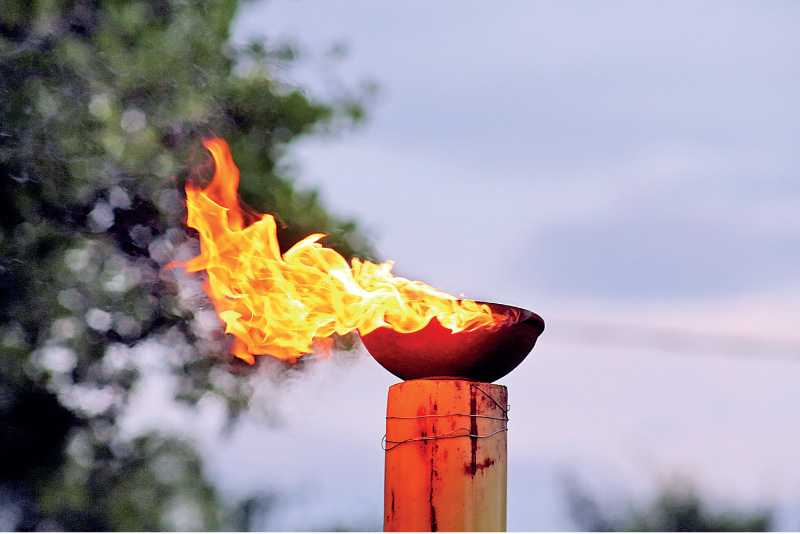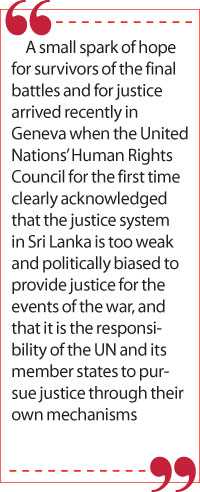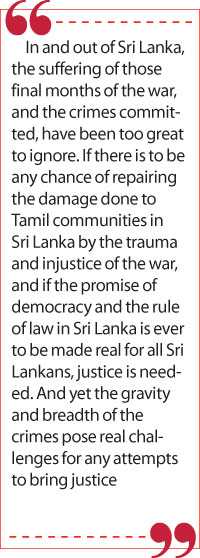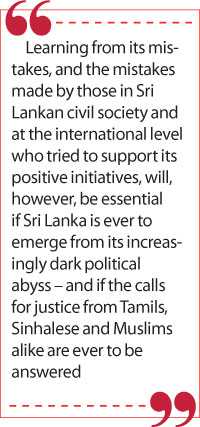Monday Feb 23, 2026
Monday Feb 23, 2026
Thursday, 20 May 2021 00:00 - - {{hitsCtrl.values.hits}}

As we remember the pain and suffering of victims of the final battles at Mullivaikkal and elsewhere in the north, we must not forget that the silenced voices also included the many thousands – Tamil, Sinhala, Muslim, Burgher – who struggled in their different ways for a Sri Lanka that is equally shared by all people, and were killed for this radical idea – killed by Government forces, killed by Sinhala mobs, but also killed by the LTTE and other Tamil militants
 The first five months of 2009 brought immense and unprecedented pain to the people of northern Sri Lanka, and to their many Tamil relatives outside the country who looked on and received daily reports of death and injury and misery. Their efforts, and the efforts of concerned people in the rest of Sri Lanka and the world to bring a humanitarian pause to the war to limit the loss of life, ultimately failed.
The first five months of 2009 brought immense and unprecedented pain to the people of northern Sri Lanka, and to their many Tamil relatives outside the country who looked on and received daily reports of death and injury and misery. Their efforts, and the efforts of concerned people in the rest of Sri Lanka and the world to bring a humanitarian pause to the war to limit the loss of life, ultimately failed.
They failed due to the determination of the Sri Lankan Government to destroy the Liberation Tigers of Tamil Eelam and their civilian support base once and for all, regardless of the human cost. And they failed thanks to the support the Government’s military strategy received from key regional and global powers with only tentative resistance towards the end.
A humanitarian catastrophe
I remember well the feeling of helplessness and horror I felt in Colombo those months, as the warnings of a humanitarian catastrophe made by my organisation and others, including parts of the UN — warnings made possible by reporting by Tamil health and humanitarian workers trapped in the fighting — fell largely on deaf ears.
The numbers of those killed in the four months leading up to the official end of the war on 18 May 2009, and in the days that immediately followed, still remain disputed. Estimates range from the Government’s unlikely claims of fewer than 10,000, to the UN’s two estimates of as many as 40,000, or even 70,000, to those that point to as many as 147,000 people unaccounted for based on figures from district-level Government officials at the time. With the Sri Lankan Government allowing no independent investigation to take place in Sri Lanka, all estimates have remained disputed and highly politicised.
What is more clear are the crimes committed in those final months: by the military, which indiscriminately shelled and bombed areas densely packed with civilians, attacked hospitals and makeshift medical centres, and executed surrendering LTTE fighters, political wing leaders and their families; and by the LTTE, who forcibly recruited civilians to fill their depleted ranks and who shot many civilians who attempted to flee from the scenes of battle into Government controlled territory.
The circles of trauma and pain extend much wider, throughout the communities of the north and east and through the global Tamil diaspora and those who work with them or who have reported on or covered the events and their aftermath. While the stories and evidence of terrible suffering and crimes of war are readily available outside Sri Lanka, the voices and experiences of victims and survivors are still well-hidden outside the north and east and in the Sinhala-language media in Sri Lanka.
The injustice of the crimes themselves have been compounded by the security forces, under successive governments, actively obstructing attempts by families to find the truth of what happened to their loved ones, tens of thousands of whom remain disappeared to this day, and were often last seen in the custody of the military or police.
Nonetheless, in and out of Sri Lanka, the suffering of those final months of the war, and the crimes committed, have been too great to ignore. If there is to be any chance of repairing the damage done to Tamil communities in Sri Lanka by the trauma and injustice of the war, and if the promise of democracy and the rule of law in Sri Lanka is ever to be made real for all Sri Lankans, justice is needed. And yet the gravity and breadth of the crimes pose real challenges for any attempts to bring justice.
Deep resistance to facing the truth
The challenge begins with the deep resistance to facing the truth from within Sinhala society. With the media censored, and/or strongly nationalist, many Sinhalese have never heard the real story of suffering of their Tamil co-citizens in the north. In part as a result, many feel their own pain and suffering from the war – from the loss of loved ones fighting with the Government or killed in LTTE bombings – has been ignored.
There is also a deep resistance among many to acknowledge the crimes committed in their name and thereby to relinquish the symbolic and material benefits of their collective victory over what they have been taught to see as merely a “ruthless terrorist group”.
These sentiments have been encouraged and exploited politically by past governments and most vigorously by the current Government, now headed by one of the proud architects of the victorious military campaign and featuring, in senior positions, many of the generals and commanders who fought the final battles – some of them implicated by UN reports in some of the worst alleged crimes of the war.
Justice for crimes by State agents has never been easy to achieve in modern Sri Lanka, but for the foreseeable future, justice will be virtually impossible for the crimes of the war, especially during its final horrific months.
 A small spark of hope for survivors
A small spark of hope for survivors
However, a small spark of hope for survivors of the final battles and for justice arrived recently in Geneva when the United Nations’ Human Rights Council for the first time clearly acknowledged that the justice system in Sri Lanka is too weak and politically biased to provide justice for the events of the war, and that it is the responsibility of the UN and its member states to pursue justice through their own mechanisms.
In its key paragraph, the Council resolved “to strengthen... the capacity of the Office of the High Commissioner to collect, consolidate, analyse and preserve information and evidence and to develop possible strategies for future accountability processes for gross violations of human rights or serious violations of international humanitarian law in Sri Lanka, to advocate for victims and survivors, and to support relevant judicial and other proceedings, including in Member States, with competent jurisdiction.”
Following the council’s adoption of its most critical resolution to date on Sri Lanka, there are growing calls for the US, the UK and the EU to use their recently adopted “Magnitsky” laws to apply targeted sanctions against key figures in the Sri Lankan government for their alleged involvement in some of the worst crimes of the war.
Slow wheels of international justice have started to turn
The slow wheels of international justice have thus started to turn — but they will provide no quick solutions or easy answers. However necessary, initial steps will likely be slow, incomplete and frustrating. Despite more than a decade of calls for Sri Lanka’s case to be taken to the International Criminal Court in The Hague, it has long been known that the politics of the UN Security Council mean there is no chance of this happening.
With regard to more recent calls by activists for a state party to present a case of genocide against Sri Lanka at the International Court of Justice, experienced international lawyers have indicated there is very little chance of this being taken up. Foreign governments, in turn, are likely to remain reluctant to pursue cases in their own courts, given the extensive resources needed to produce a strong case.
This reluctance is compounded by worries about the effects within Sri Lanka of foreign sanctions and potential prosecutions within Sri Lanka. Many worry, and not without reason, that trials and sanctions outside the island could further harden attitudes of some Sinhalese and be used by the Government to rebuild its flagging public support.
 Competing communal identities
Competing communal identities
To date, unfortunately but not surprisingly, demands for justice for war crimes and genocide have often been articulated — and rejected — as part of Sri Lanka’s long-running battle of competing communal identities. This is in part the effect of the refusal of the Sri Lankan State and Sinhalese leaders to acknowledge the crimes committed by the forces they commanded. But it is also an effect of the fact that demands for war-time justice are for many Tamils a continuation of the Tamil nationalist liberation struggle.
The events of 2009 are seen by many Tamils, and not without some significant evidence, as a key stage in an ongoing campaign of structural genocide by the Sri Lankan State, a campaign that makes living amongst Sinhalese in a single state unsafe and unjust. The call for international justice, in this version, is effectively part of the larger call for liberation from oppression and foreign occupation.
Recent history suggests, however, for better or worse, that the future of the island currently known as Sri Lanka is one that must be shared by all its distinct communities. This sharing is currently not an equal one, nor a secure one for many, and especially not for its numerically minority peoples, Tamils and Muslims.
Justice as a process of liberation
This poses a fundamental challenge: is it possible to rethink – and refashion – justice as a process of liberating all the peoples of Lanka from the now half-century of political violence and political marginalisation that has wounded all communities and degraded its democratic institutions?
Can the process of justice be shifted from being part of a battle between communities to being a process of liberation from the cycle of violence and discrimination that can bring lasting peace to the island and a safe and secure and rights-respecting future to all its peoples? Can the fight for justice become a vehicle to ensure that all people on the island are secure and equal, with their specific traditions, languages, religions and identities recognised and protected?
To achieve this ambitious – but if Sri Lanka is to achieve lasting peace, essential – goal, will require addressing the continuing conflict and the mistrust on all sides. This will, crucially, require winning acknowledgement by much larger numbers of Sinhalese of the injustices and crimes committed in their name and in many cases, with their complicity.
Meeting this challenge – and it is an enormous challenge – is largely the responsibility of Sinhalese political, religious, community and business leaders. As the majority community, Sinhalese leaders have the greater moral burden to take up the task. But as the majority, they also have a smaller incentive to do so.
For the process of justice to be liberating – for the Tamil people most urgently, but for all people on and from the island – some part of this challenge must also be taken up by Tamil leaders. Just as there has been resistance from many Sinhalese to acknowledge the injustice of what so many see as a just war against terrorism, so there is also resistance from many Tamils to accept the injustices and crimes that often accompanied their own national liberation struggle.
As we remember today the pain and suffering of victims of the final battles at Mullivaikkal and elsewhere in the north, we must not forget that the silenced voices also included the many thousands – Tamil, Sinhala, Muslim, Burgher – who struggled in their different ways for a Sri Lanka that is equally shared by all people, and were killed for this radical idea – killed by Government forces, killed by Sinhala mobs, but also killed by the LTTE and other Tamil militants.
This involved not only the crimes and acts of terror committed over the years against non-combatant Sinhalese, but also against other Tamils. More directly relevant to today’s commemoration, this includes the forced recruitment, including of teenagers, and murders of many who attempted to flee the LTTE’s final shrinking areas of control in April and May 2009. These crimes have been well-documented by UN and other reporting and are only part of the ways in which the Tamil Tigers’ own policies contributed in significant ways to the enormous suffering of Tamil civilians in 2009.
Building bridges across ethnic and religious divides
To acknowledge the LTTE’s contribution to the catastrophe of 2009 is not to assert a false equivalence between their actions and the Government’s disregard of international humanitarian law or to lessen the moral gravity and need to reverse the Sri Lankan State’s years of deeply institutionalised discrimination. It offers, instead, a small but important opening for building bridges across the island’s ethnic and religious divides and ultimately for winning support from enough Sinhalese to create the political space for justice claims to be heard — and maybe eventually acted on — within Sri Lanka, which is where they will have the most useful and liberating effect.
We have already seen a parallel example of the productive possibilities of cross-community bridge-building with this year’s Pottuvil-to-Polikandy, or P2P, march, which brought together the different and shared concerns of Tamils and Muslims and has begun to repair the deep damage done by the actions of the LTTE and Muslim armed groups and politicians during the war.
Forging new alliances with Sinhalese political forces will be no easy task, and will require major shifts among Sinhalese as much or more than among Tamils. Being optimistic about the political possibilities of this approach is admittedly difficult, especially in the wake of the failure of the Coalition Government of 2015, which was built on a cross-ethnic alliance.
Learning from its mistakes, and the mistakes made by those in Sri Lankan civil society and at the international level who tried to support its positive initiatives, will, however, be essential if Sri Lanka is ever to emerge from its increasingly dark political abyss – and if the calls for justice from Tamils, Sinhalese and Muslims alike are ever to be answered.
(The writer is a senior consultant with the International Crisis Group and a visiting fellow at the London School of Economics and Political Science. These remarks were made in his personal capacity for an online commemoration event, ‘Remembering Vanished Voices,’ hosted by the Canadian Tamil Congress on 16 May.)